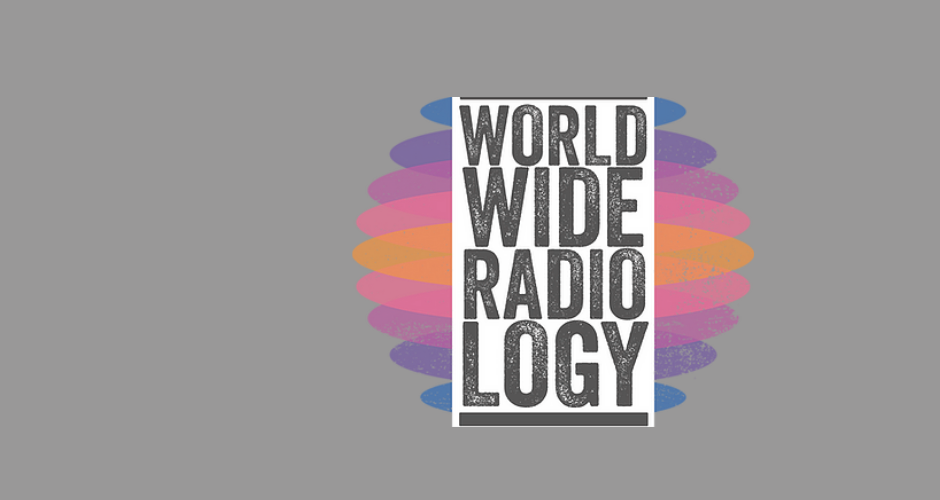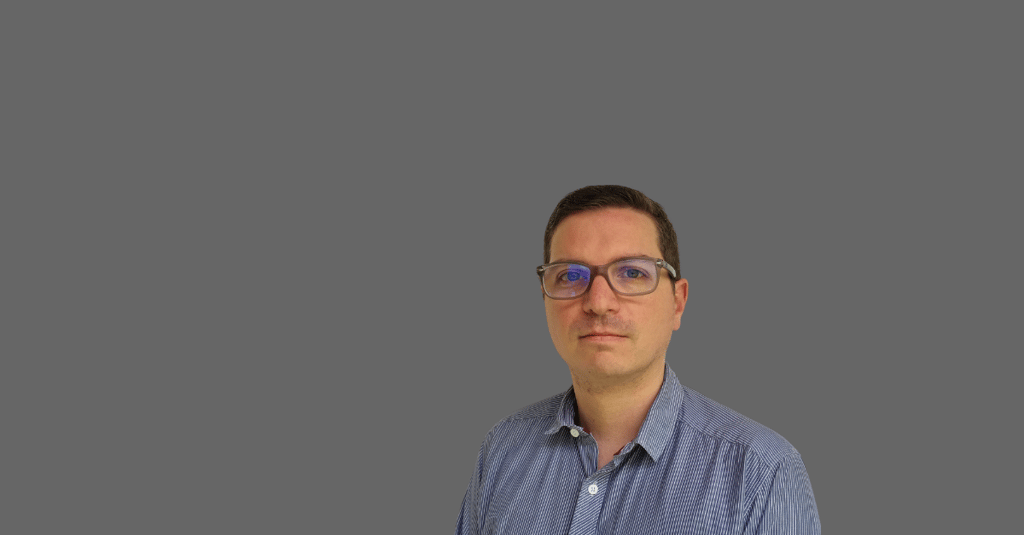Worldwide Radiology report
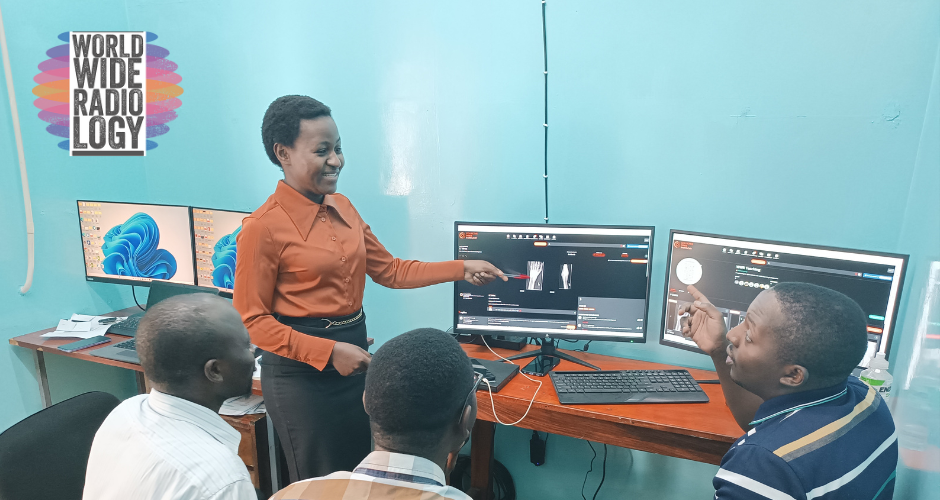
Since 2021 Worldwide Radiology have been using Collective Minds as a platform to provide support to their partners across Africa, through a range of reporting, consultation, and teaching initiatives.
At Collective Minds, we are very impressed by the work Worldwide Radiology are doing and would like to share their report from some of the key initiatives they have been running over the past few years. Enjoy and please make sure to follow their great work here
Remote Radiology Consultation service: Komfo Anokye Teaching Hospital, Ghana
Worldwide Radiology has a long history of supporting radiology services at Komfo Anokye Teaching Hospital (KATH) in Kumasi, Ghana. Using Collective Minds has allowed us to support Ghanaian radiologists remotely, by offering a consultation service on CT and MR scans. Radiologists at KATH can upload any scans they need assistance with to a dedicated Collective Minds group. A number of volunteer consultant radiologists at Worldwide Radiology are then on hand to provide their expert advice.
To date, 25 cases have been discussed between the radiologists at KATH and those at Worldwide Radiology. Cases have included complex paediatric neurology, chronic musculoskeletal injuries, as well as acute cases such as respiratory distress syndrome and splenic artery aneurysm. A user survey demonstrated that patient management had been changed in 75% of cases as a direct result of the advice offered, guiding treatment choices and decisions on further investigations.
“Patient was managed for the infarct without the need of additional imaging or investigations.” “Given Vitamin D supplements. Follow up MRI in 1 year.” – Feedback from KATH radiologists
The survey also demonstrated a ‘major’ impact on practice in 50% of the cases discussed, with a moderate or minor impact in the remainder. The Ghanaian radiologists reported increased confidence in their diagnostic abilities, as well as receiving valuable education on various pathologies from Worldwide Radiology consultants.
“My confidence in diagnosing periventricular leukomalacia on MRI has increased and I will be more likely to independently make a diagnosis in the future” – Feedback from KATH radiologist.
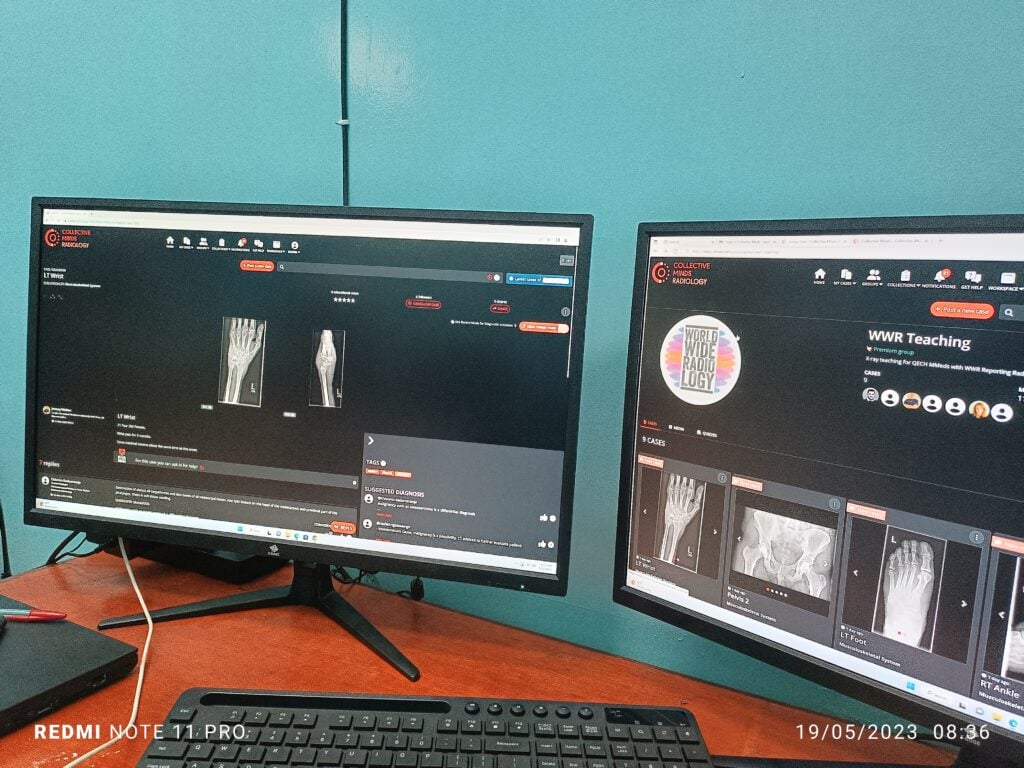
Remote Radiology Consultation service: Medical Research Council (MRC) The Gambia
Like many low-income countries in the African region, The Gambia suffers from a lack of radiologists. This means that the majority of radiology images receive no specialist report and are interpreted by the requesting clinician. In an effort to address this problem, Worldwide Radiology have been offering an expert second opinion service on radiology cases, using the Collective Minds platform to connect MRC clinicians with volunteer radiologists and reporting radiographers. Collective Minds is also used to share radiology images at the MRC’s monthly multi-disciplinary team (MDT) meeting, which is attended remotely by Worldwide Radiology volunteer radiologists.
So far, 180 cases have been shared in the dedicated MRC group on Collective Minds, with many of these cases also being discussed at the MDT. These include X-ray, CT, and MR images, covering a wide range of patients and pathologies.
A total of 18 MRC clinicians have benefitted from the expert second opinions provided by Worldwide Radiology volunteers.
A user survey revealed that the expert advice provided changed patient management in 70% of cases. This included detecting abnormalities not picked up by the clinician, guiding treatment decisions and preventing unnecessary investigations, guiding decisions about further imaging, and improving confidence in diagnosis, which helped clinicians to advocate for their patients and provide them with better explanations of diagnoses and treatment options.
Feedback from MRC Clinicians:
“Patient had been on long-term antibiotics for osteomyelitis, based on MDT discussion antibiotics were stopped for this indication.”
“In The Gambia, the cost of a CT is very high for the patient. Having help to decide if it is definitely needed is useful.”
“We were able to explain the diagnosis to the family which meant that we were able to persuade them to allow the patient to stay in the MRC to receive treatment, rather than take him home to try local remedies.”
“We have pushed more for management by the TB team due to the information given”
The survey also demonstrated a major impact on practice in over 50% of cases discussed, with a moderate or minor impact in the remainder. This impact ranged from improved understanding of certain pathologies and differential diagnoses, to improved image interpretation skills and increased confidence, as well as encouraging the use of other imaging modalities.
“We will continue to use this system and also look for aspergilloma.”
“Very useful comments by the specialist helping with understanding current processes in the lung and differentiating between active/chronic/scarred appearances.”
“I think I might now be able to tell when a lesion is in the ant mediastinum.” “I will be a bit more confident to trust myself if I think an image is normal.” “Encouraged me to use CT to get a fuller picture.”
Feedback from MRC clinicians
Remote Radiology Reporting service: Queen Elizabeth Central Hospital, Malawi
A lack of qualified radiologists is also a problem in Malawi, particularly at the consultant level. This means that many of the CT scans performed at Queen Elizabeth Central Hospital (QECH) go unreported. To address this issue, Worldwide Radiology are providing a remote reporting service to QECH, using Collective Minds to enable volunteer consultant radiologists based in a range of countries to provide consultant level reports of CT scans.
Since the service commenced in January, a total of 77 cases have been reported by our radiologists, with numbers anticipated to increase over the coming months. Cases have included acute injuries, TB, sarcoma, liver lesions, and paediatric neurology.
A total of 6 volunteer consultant radiologists from a range of specialties have been active in reporting cases, with another radiologist recently recruited. The impact of this service has not yet been assessed, however informal feedback has so far been very positive and the service seems to be making a real difference to patients and radiology staff at QECH. Feedback from the remote reporters has also been encouraging, with 50% saying that they have learned something new or advanced their practice by reporting cases from Malawi.
“Late presentation of disease not typically seen in the UK” – Feedback from WWR volunteer radiologist
Worldwide Radiology Teaching service: Queen Elizabeth Central Hospital, Malawi
The first group of doctors to train as radiologists in Malawi started their training in September 2022. Worldwide Radiology has been supporting their education via regular teaching sessions on plain film interpretation between the trainee radiologists and a reporting radiographer based in the UK. Collective Minds has provided a platform for our volunteer reporting radiographer to share and discuss images with the trainees, through a dedicated private group.
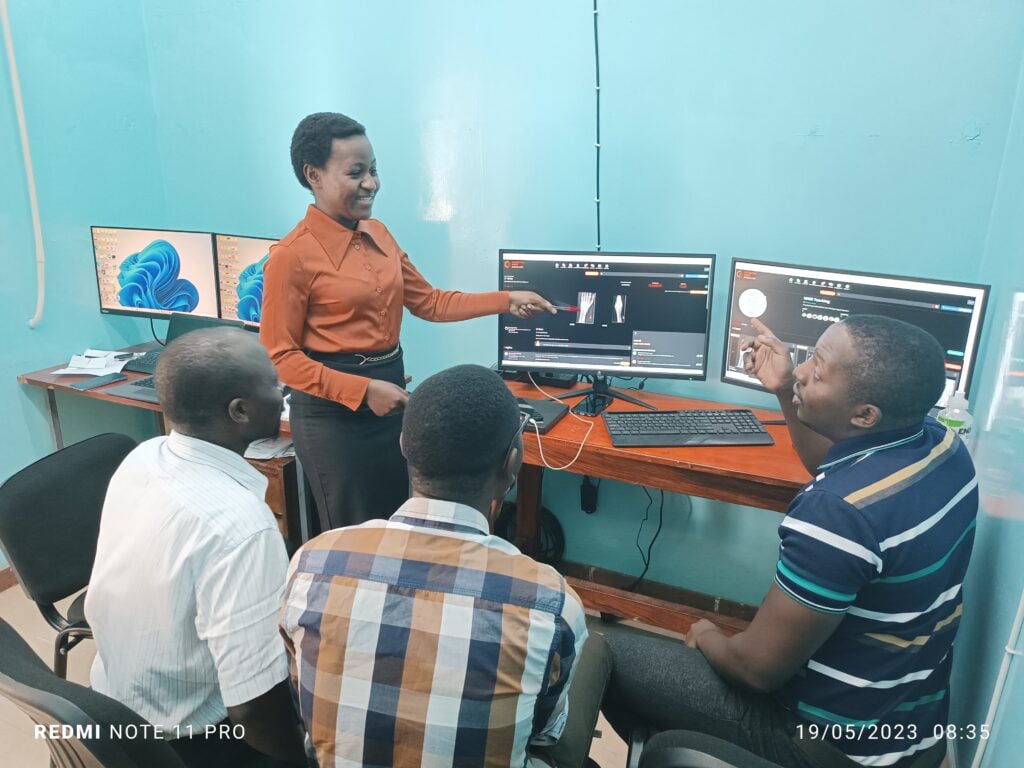
“This training is a great learning opportunity for us as JW is an experienced reporting radiographer and since we started interacting with him, our understanding of X-Ray images is improving.”
“This current program has solved the problem of the unavailability of practical learning material from our side. It also has added a tutor for us, which means we have an opportunity to also learn from more than one expert on the interpretation of X-rays.”
“In the long term, it is our expectation that we will become better at interpreting X-ray images which is necessary for our patients to have a correct radiological diagnosis so that they get appropriate care. It will also help us excel in our career as future radiologists.”
“It is therefore our hope that such sessions continue and many more other experts join the arrangement so that we can be exposed to as much diverse knowledge as possible, hence solidifying our competency.” Drs Chisomo Kadammanja and Rashid Ngalawango, Malawi.
Feedback from QECH trainee radiologists Chisomo Kadammanja and Rashid Ngalawango
“I have been involved in teaching radiographers, medical students, physiotherapists, radiologists and nurse practitioners in the NHS since 2004. Being able to contribute to this has been a great privilege and hugely rewarding. There is the perception that it is only possible to do this type of work in the field, by doing placements. I hope I’ve been able to demonstrate that with a few hours a week, I can make a positive impact.” - Jeremy Weldon, reporting radiographer and WWR volunteer.

